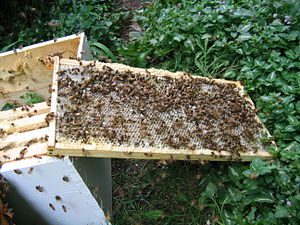
English: Honey bees cleaning the last of the honey off of a comb which has been processed. (Photo credit: Wikipedia)
Initially, I was excited to see Time Magazine‘s August 19th issue featuring bees and the problem of colony collapse disorder, “The Plight Of The Honeybee;” [1] however, my enthusiasm quickly dissipated when I discovered that the article fails by not addressing the impact of factory farming as a major contributor to the demise of bees.
The steady disappearance of bees is a frequent topic of concern for conservationists, beekeepers and farmers, as well as green bloggers. Our blog, Live Green Be Green, follows the subject of pollinators on a frequent basis, commenting on bees, in particular, noting that they play an important role in the maintenance of the food supply as we know it. While it may be true (as stated in Time’s article) that the demise of bees would not destroy the food supply totally, it is important to note that this phenomenon would change the landscape of the food supply, resulting in the loss of many fruits and vegetables that we enjoy eating. [2]
Much of the attention on the causes of colony collapse disorder in this article is attributed to pesticides, viruses and fungal infections, with only casual references made to factory farming of bees. Additionally, the comments made deal with factory farming in general, citing the increase in widespread industrialized agricultural systems that have adopted crop monocultures, which effectively “create a desert for bees,” starving them of the nectar and pollen they need to survive. [3] Also, mention is made of a possible future with the industrialization of beekeeping culminating in fewer entities running larger operations or even the use of robotic bees to pollinate crops. Clearly, this article ignores the problem of factory farming of bees. Under this scenario, bees are transported from the natural locales and maintained in smaller boxes, which resemble tenements or file cabinets. These actions subject the creatures to unnatural living conditions. Also, the bees are forced to undergo other harmful practices, such as wing clipping of new queen bees to prevent the natural migration of these bees and their soldiers to form their own colonies, thereby reducing the honey production in the prior colony.These practices typically result in genetic manipulation of the bees and in their premature death. [4]
To learn more about the true plight of bees, we here at LGBG by PMD United encourage you to see “No More Honey,” a film documentary that raises awareness of the practice of factory farming of bees. [5] We remain dedicated to learning and sharing information that promotes a healthy environment for ourselves and future generations. We feel it is mandatory that when sharing information, we should seek the complete story. In terms of our food supply, we feel that while it may be possible to “exist” without many of the plant species that we have come to love, it is important that we abandon harmful practices that deliberately destroy these products. We feel that bees make our world a better place. To protect them is to live green, be green.
________________________
[1] Walsh, Brian “The Plight Of The Honeybee.” Time 19 Ap. 2013: 24-31. Print.
[2] “Honeybee Shortage– An Impending Economic Disaster.” http://livegreenbegreen.com/2013/05/07/honeybee-shortage-an-impending-economic-disaster 7 May, 2013.
[3] Walsh, p. 30.
[4] http://www.peta.org/b/thepetafiles/archive/2011/07/13/that-s-no-storm-its-a-swarm.aspx
[5] http://livegreenbegreen.com/2013/08/08/colony-collapse-documentary-addresses-global-destruction-of-bee-population/

